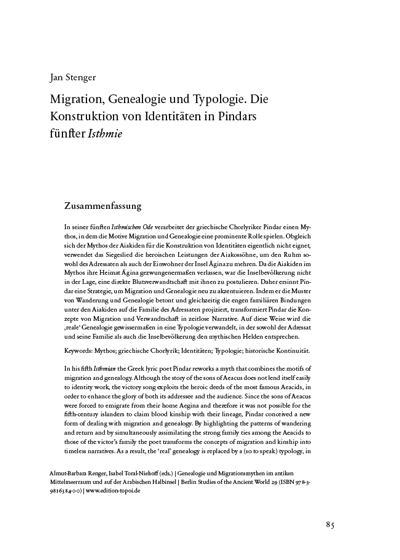Migration, Genealogie und Typologie
Die Konstruktion von Identitäten in Pindars fünfter Isthmie
In his fifth Isthmian the Greek lyric poet Pindar reworks a myth that combines the motifs of migration and genealogy. Although the story of the sons of Aeacus does not lend itself easily to identity work, the victory song exploits the heroic deeds of the most famous Aeacids, in order to enhance the glory of both its addressee and the audience. Since the sons of Aeacus were forced to emigrate from their home Aegina and therefore it was not possible for the fifth-century islanders to claim blood kinship with their lineage, Pindar conceived a new form of dealing with migration and genealogy. By highlighting the patterns of wandering and return and by simultaneously assimilating the strong family ties among the Aeacids to those of the victor’s family the poet transforms the concepts of migration and kinship into timeless narratives. As a result, the “real” genealogy is replaced by a (so to speak) typology, in which on the one hand victor and his family and on the other hand the islanders resemble the mythical heroes.
In seiner fünften Isthmischen Ode verarbeitet der griechische Chorlyriker Pindar einen Mythos, in dem die Motive Migration und Genealogie eine prominente Rolle spielen. Obgleich sich der Mythos der Aiakiden für die Konstruktion von Identitäten eigentlich nicht eignet, verwendet das Siegeslied die heroischen Leistungen der Aiakossöhne, um den Ruhm sowohl des Adressaten als auch der Einwohner der Insel Ägina zu mehren. Da die Aiakiden im Mythos ihre Heimat Ägina gezwungenermaßen verlassen, war die Inselbevölkerung nicht in der Lage, eine direkte Blutsverwandtschaft mit ihnen zu postulieren. Daher ersinnt Pindar eine Strategie, um Migration und Genealogie neu zu akzentuieren. Indem er die Muster von Wanderung und Genealogie betont und gleichzeitig die engen familiären Bindungen unter den Aiakiden auf die Familie des Adressaten projiziert, transformiert Pindar die Konzepte von Migration und Verwandtschaft in zeitlose Narrative. Auf diese Weise wird die “reale” Genealogie gewissermaßen in eine Typologie verwandelt, in der sowohl der Adressat und seine Familie als auch die Inselbevölkerung den mythischen Helden entsprechen.

